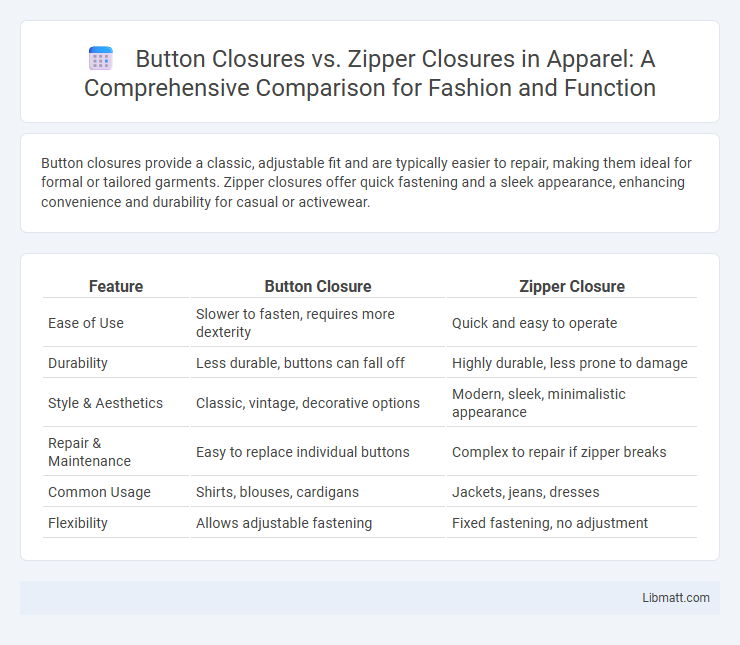Button closures provide a classic, adjustable fit and are typically easier to repair, making them ideal for formal or tailored garments. Zipper closures offer quick fastening and a sleek appearance, enhancing convenience and durability for casual or activewear.
Table of Comparison
| Feature | Button Closure | Zipper Closure |
|---|---|---|
| Ease of Use | Slower to fasten, requires more dexterity | Quick and easy to operate |
| Durability | Less durable, buttons can fall off | Highly durable, less prone to damage |
| Style & Aesthetics | Classic, vintage, decorative options | Modern, sleek, minimalistic appearance |
| Repair & Maintenance | Easy to replace individual buttons | Complex to repair if zipper breaks |
| Common Usage | Shirts, blouses, cardigans | Jackets, jeans, dresses |
| Flexibility | Allows adjustable fastening | Fixed fastening, no adjustment |
Introduction to Button and Zipper Closures
Button closures consist of a series of small, sewn discs or shapes that fasten through buttonholes, offering a classic and adjustable fit commonly found in shirts, jackets, and pants. Zipper closures use interlocking metal or plastic teeth and a sliding mechanism to provide quick, secure fastening favored in outerwear and accessories. Understanding the differences helps you choose the appropriate closure type for comfort, style, and practicality in your garments.
Historical Evolution of Garment Closures
Button closures date back thousands of years, with early examples found in the Indus Valley Civilization around 2000 BCE, initially serving decorative purposes before evolving into functional fasteners. Zipper closures were invented in the late 19th century, gaining widespread popularity in the early 20th century due to their efficiency and ease of use, revolutionizing garment design. Understanding the historical evolution of these closures helps you appreciate their impact on fashion innovation and garment functionality.
Design and Aesthetics Comparison
Button closures offer a classic, timeless aesthetic that enhances garments with a handcrafted, detailed appeal, often visible as decorative elements on shirts or jackets. Zipper closures provide a sleek, modern look, contributing to streamlined designs and functional minimalism ideal for activewear or contemporary outerwear. Your choice between button and zipper closure can significantly influence the overall style and perceived sophistication of the garment.
Functionality and Ease of Use
Button closures provide adjustable fastening and a classic look but can require more time and dexterity to fasten compared to zipper closures. Zipper closures offer quick, secure, and smooth operation, making them ideal for convenience and speed. Your choice depends on prioritizing ease of use with zippers or the flexibility and style that buttons offer.
Durability and Longevity
Button closures typically offer greater durability over time due to their simple design and the ease of replacing individual buttons if they become damaged. Zipper closures can wear out faster because of mechanical failure, such as teeth misalignment or slider breakage, especially with frequent use. Nonetheless, high-quality zippers made from robust materials can provide excellent longevity, often matching the lifespan of button closures when properly maintained.
Comfort and Fit Considerations
Button closures offer adjustable fit options, allowing your garment to conform more precisely to your body shape, enhancing comfort throughout the day. Zipper closures provide a secure and smooth fastening experience, ensuring a snug fit without gaps, which can be especially beneficial for active wear. Depending on your preference for flexibility or quick fastening, choosing between button and zipper closures impacts the overall comfort and fit of your clothing.
Maintenance and Repair Differences
Button closures require regular inspection to ensure buttons are securely sewn, as loose or missing buttons are easy to replace but may need needle and thread skills. Zipper closures demand more careful handling to prevent teeth misalignment or slider damage, often necessitating specialized repair kits or professional services for replacement. While buttons offer simple, cost-effective repairs, zippers provide quicker fastening but involve more complex maintenance challenges.
Environmental Impact and Sustainability
Button closures typically have a lower environmental impact compared to zipper closures, as buttons are often made from biodegradable materials such as wood, coconut shell, or recycled metals, reducing landfill waste. Zipper closures generally involve synthetic components like plastic teeth and metal sliders, which require more energy-intensive manufacturing processes and pose recycling challenges. Choosing button closures can contribute to sustainable fashion by minimizing non-biodegradable waste and supporting eco-friendly material sourcing.
Suitability for Various Garments
Button closures are ideal for tailored garments like blazers and dress shirts, offering a classic and adjustable fit, while zipper closures provide fast and secure fastening for casual wear, jackets, and activewear. Your choice depends on the garment's design and intended use, with buttons allowing for more style versatility and zippers catering to convenience and durability. Understanding these nuances ensures optimal functionality and aesthetic appeal for your clothing.
Choosing Between Button and Zipper Closure
Selecting between button and zipper closures depends on factors like ease of use, durability, and style preference. Buttons offer customizable fastening options and a classic aesthetic ideal for tailored garments, while zippers provide quick, secure closure suited for activewear and outerwear. Consider the garment's purpose and desired look to determine whether the traditional appeal of buttons or the practicality of zippers aligns best with your needs.
Button Closure vs Zipper Closure Infographic

 libmatt.com
libmatt.com